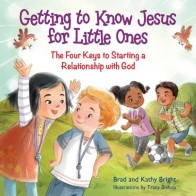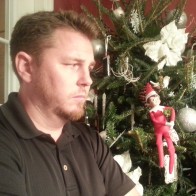Matt is a member of our Discover God 4Kids team and my guest blogger today. When he told me his very funny story about Elf on the Shelf I asked him to share it!
My Elf Experiment…
We have an Elf on the Shelf.
A very well-meaning, family-oriented, God-fearing family gave him to us this year. What did I do to merit such harsh treatment? I thought we were friends.
I am not a fan of the elf doll who supposedly comes to life at night and moves about the house getting into mischief. The accompanying storybook says his job is to keep an eye on younger children and give Santa a “naughty or nice” report… Santa spy.
Am I a Scrooge, or is there something seriously wrong here?
After all, I thought Santa “…sees me when I’m sleeping, knows when I’m awake, knows if I’ve been bad or good…” Is that not true???
I think I have very legitimate, social and theological reasons for despising the elf—all elves on all shelves—what’s a dad to do? Am I supposed to be thrilled that our culture has permeated my home with another commercialistic lie to try to bribe my children into good behavior?
My wife says no one cares. She feels differently than I do about the elf… She is excited to establish a fresh, new, endearing Christmas tradition.
My kids feel differently about the elf… They love that they are finally normal like all the other kids in our neighborhood and can trade elf stories.
I was stuck. So, I decided to have some fun with it…
“Elf” needed a name. The storybook emphasizes that the Christmas “magic” doesn’t work if the elf has not officially been given a name. Each family member made a suggestion and then we anonymously cast our vote for the name we liked best.
I was ecstatic when my name idea won! “Mephistopheles” was ready to spring into action. Sadly, I felt it only fair to tell my wife that Mephistopheles was a caricature of the devil in German folklore (which seemed appropriate at the time). Naturally, I was scolded and the elf was renamed.
“Terwilliger” first appeared on Black Friday (no comment) riding atop one of our chicken figurines. On Saturday he showed up as an ornament on our freshly decorated Christmas tree. (Apparently the magic was working because I know I wasn’t doing anything with that cheeky little troll.)
Then came my “crisis of belief” moment.
Sunday afternoon a few neighborhood kids ran through our living room with some of my own kids. The conversation went something like this:
“Where was your elf this morning?”
“In the Christmas tree. Where was yours?”
“In the sink.”
“Ha! Mine was in the sink yesterday. I can’t wait to see where he’ll be tomorrow!”
“I love my elf on the shelf—he’s funny!”
I’m not sure why or how, but it stirred my inner elf.
The kids really do like the Elf on the Shelf. It’s fun. It’s silly. Do they think it reports back to Santa Claus about their behavior? I don’t know, but it’s fun and they love it. And they eagerly talk to their friends about it.
Suddenly I saw my elf problem as an opportunity to see God work.
I got more excited as I thought about the possibilities: The kids wake up and search for the elf. They find him, and rather than finding that he has been up to no good, he has written a note to them with an idea for how they can display kindness or goodness or peace or love to their family members. Tied to that, he might emphasize that because God is love we can show love to others.
Not only might the kids try to intentionally show kindness to one another, they might tell their friends about their elf’s notes of encouragement and, in so doing, share something about who God is to our neighborhood.
So my elf problem is now My Elf Experiment. Terwilliger and I are going to make it our mission to daily point our kids to who God is and why He matters, especially at this time of the year. We’ll still probably end up doing some funny things, and I’ll take photos and post them to Discover God 4Kids Facebook page (#elfontheshelf, #myelfexperiment) with updates sharing how it goes, and we’ll see what happens. Maybe this will be Terwilliger’s only year with us as a family. Or maybe—hopefully—he will be the starting point of some children’s conversations (maybe some adults’ too) that leave them longing to not just find the elf on the shelf, but to find a real, loving personal Savior.










